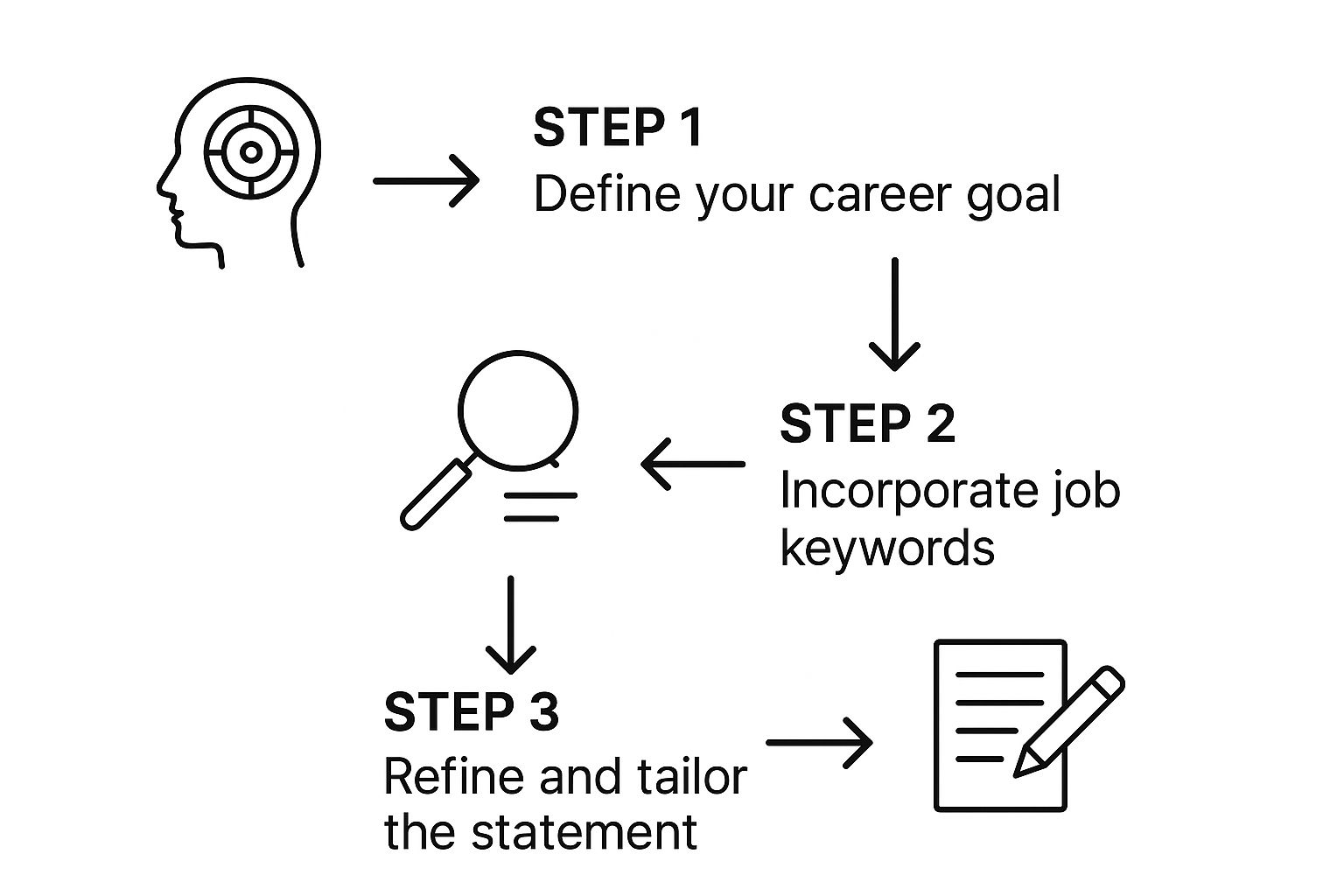A career objective is a short, sharp statement that sits at the top of your curriculum vitae (CV). It’s your opening pitch, designed to tell a recruiter precisely what your professional goals are and why you’re the right person for this specific job. Think of it as a two-to-three-sentence trailer for your entire career story.
Why Your Career Objective Still Matters
Let's be honest, you've probably heard that the career objective is a bit old-fashioned; a relic from a bygone era of CV writing. But in today’s fiercely competitive job market, a targeted, well-written objective has never been more important. It’s your chance to make a powerful first impression and give a hiring manager a quick snapshot of who you are, what you bring to the table, and how you can make a difference.
The Australian job market is buzzing with activity. In 2023 alone, around 9.7 million people were on the hunt for a new role at some point during the year. With recruiters spending a mere 6 to 8 seconds on each application, those first few lines on your CV have to work incredibly hard. You can find more statistics on the Australian job market over at Standout Resume.
Your Strategic Advantage
Think of the career objective as the headline for your professional brand. It sets the scene for everything that follows, framing your experience and proving you’re a serious candidate who has done their homework. A compelling objective can be the very thing that stops a recruiter from hitting the ‘reject’ button.
It’s also your secret weapon for getting past Applicant Tracking Systems (ATS). These are the automated systems that scan your CV for keywords before a human even sees it. A tailored objective helps you:
- Integrate Keywords Naturally: By echoing the language from the job description, you significantly boost your chances of passing that initial ATS scan.
- Show Clear Intent: It proves you haven't just spammed your CV out to hundreds of listings. It shows you’ve put thought into this specific role and organisation.
- Highlight Your Value Proposition: It immediately tackles the recruiter's biggest question: "Why should I even consider this person?"
A generic objective screams, "I just need any job." A tailored one says, "I am the perfect solution to your specific problem." That shift in perspective is what grabs a recruiter's attention and makes them want to learn more.
Ultimately, a strong career objective isn’t just a box to tick. It’s a strategic tool. It clearly communicates where you're headed, aligns your skills with what the employer desperately needs, and ensures your application gets the attention it deserves in a very crowded field.
The Anatomy of a Compelling Objective

A great career objective isn't just a throwaway sentence at the top of your CV. It's a strategic statement, carefully built from three core components. Think of it as your thirty-second elevator pitch designed to instantly show a hiring manager why you matter. Getting this structure right is a fundamental step toward writing a standout resume.
The Three Essential Pillars
To build an objective that's both powerful and concise, you need to bring three key elements together. Let's break them down.
Your Professional Identity: Who Are You?
This is where you state your title, your area of expertise, and how long you've been in the game. Are you a "detail-oriented data analyst with three years of experience" or a "creative graphic design graduate"? This gives the hiring manager immediate context. Be specific.Your Value Proposition: What Do You Offer Them?
Now, pivot from yourself to their needs. What specific skills or value can you bring to their organisation? Instead of just listing things, connect your skills to a tangible outcome. For example, you can "leverage Python and SQL to uncover actionable business insights." This shows you're results-focused.Your Career Ambition: Why This Role?
Finally, show them why you want this specific role at their company. This demonstrates genuine interest and shows how the position aligns with your professional goals. It tells them you're not just spamming applications.
Weaving these three pillars together creates a compelling narrative. Take a career changer, for instance. They might write:
"Accomplished retail manager with 8+ years of experience in team leadership, transitioning into human resources. Eager to apply proven skills in employee training and performance management to foster a positive workplace culture at [Company Name]."
This single statement covers who they are, what they offer, and what they're aiming for. It’s concise and targeted.
A quick heads-up: it's crucial to understand how resume parsing works. These automated systems are often the first 'eyes' on your application, and they're programmed to scan for keywords and relevant information right from the top of your CV. A well-structured objective helps you pass that first digital hurdle.
How to Customise Your Objective for Each Role
Sending the same generic objective with every single application is one of the fastest ways to get your CV overlooked. It’s like the difference between a form letter and a personal note—one gets tossed, the other gets a response. Proper customisation is more than just swapping out the company name, though.
It’s about dissecting the job description to find the exact language, skills, and values the employer is looking for. Your mission is to mirror their terminology, creating an objective so relevant it feels like it was written just for them. This doesn’t just get you past the automated screening software; it sends a clear message to the recruiter that you're genuinely invested in this opportunity.
Deconstruct the Job Description
Before you even think about writing, put on your detective hat. Open up the job advertisement and start highlighting the keywords, required skills, and any mentions of company culture or values.
Look for the phrases that keep popping up or are listed under "Key Responsibilities" or "Must-Haves." These are your targets. For instance, if the description repeatedly mentions "agile project management" and "cross-functional collaboration," those exact phrases need to make an appearance in your objective.
This simple visual exercise helps you clarify your goal, pull out the right keywords, and get your statement laser-focused.

This three-step flow—defining your goal, incorporating their keywords, and tailoring the final statement—is the absolute core of making your objective work for you. It guarantees you’re not just relevant, but you’re speaking directly to what the employer needs.
Mirror Their Language and Values
Once you’ve got your list of keywords, it's time to weave them naturally into your objective. The trick is to reflect the employer’s own language back at them. This instantly creates a sense of alignment and shows them you actually understand what they're asking for.
This isn’t just good advice; it’s a critical survival tactic in the Australian job market. With over 500 applications often flooding in for a single role, the average candidate has just a 2.4% chance of even being shortlisted. Tailoring your objective by mirroring the advert's language is one of the most powerful strategies you have in this fiercely competitive environment. You can find more insights on resume trends in Australia on Elevate Career Services.
A customised objective is your first and best chance to prove you've done your homework. It tells the hiring manager, "I see what you need, and I am the person who can provide it."
By taking those few extra minutes to customise, you transform yourself from just another applicant into a thoughtful candidate who gets the role on a much deeper level. And that's how you dramatically increase your chances of landing the interview.
Real-World Examples for Your Career Stage
Knowing the theory behind a good career objective is one thing, but seeing it in action is what really makes the difference. A killer objective isn't a one-size-fits-all statement; it needs to be shaped by where you are in your professional life. After all, a fresh graduate’s pitch will sound very different from a seasoned executive's.
Let's break down some specific, real-world examples for different career stages. Think of these as a starting point to help you apply the principles we've discussed and craft a statement that truly stands out.
For the Recent Graduate
Fresh out of university? Your objective needs to bridge the gap between your academic wins and your professional potential. This is your chance to showcase your enthusiasm, the relevant skills you picked up in your studies or internships, and your drive to contribute from day one. You’re selling your ambition and your readiness to learn.
Example:
"A highly motivated and detail-oriented recent marketing graduate from the University of Melbourne, eager to apply my knowledge of digital campaign analysis and social media content creation to a junior marketing role at Acme Corporation. Seeking to contribute fresh ideas and a strong work ethic to help drive brand engagement and support team goals."
Why It Works:
- Identifies the Candidate: It’s straight to the point – a recent marketing graduate.
- Highlights Key Skills: It calls out specific, in-demand skills like "digital campaign analysis" that hiring managers look for.
- Shows Genuine Interest: Naming the company shows you've done your homework and aren't just spamming applications.
For the Career Changer
When you’re switching industries, your career objective is your most important piece of real estate on your CV. It has to immediately address the pivot and translate your existing skills into the language of the new role. Your job is to connect the dots for the hiring manager, showing them how your seemingly unrelated experience is actually a huge asset.
Example:
"Accomplished retail manager with 8+ years of experience in team leadership and performance management, transitioning into human resources. Eager to apply proven skills in employee training, conflict resolution, and operational efficiency to foster a positive and productive workplace culture as an HR Coordinator."
Why It Works:
- Addresses the Transition: It’s upfront about the career change, leaving no room for confusion.
- Focuses on Transferable Skills: It smartly highlights things like "team leadership" and "conflict resolution" – skills that are pure gold in HR.
- Articulates Value: It clearly shows how past experience will directly benefit the new organisation.
For the Seasoned Expert
If you're an experienced professional aiming for a senior or leadership role, your objective needs to be sharp, concise, and focused on results. It should project authority, hint at a history of major achievements, and align your high-level expertise with the company’s strategic ambitions.
Example:
"Senior Project Manager with over 15 years of experience delivering complex IT infrastructure projects on time and under budget. Seeking to leverage expertise in Agile methodologies and stakeholder management to lead strategic initiatives and drive innovation at Tech Solutions Inc."
Why It Works:
- Establishes Credibility: Starting with "15 years of experience" instantly signals deep expertise.
- Is Results-Driven: The phrase "on time and under budget" is powerful shorthand for a track record of success.
- Aligns with Strategic Goals: It uses strong, executive-level language like "lead strategic initiatives" and "drive innovation," showing you think like a leader.
Common Mistakes That Weaken Your Objective

Knowing what to put in your career objective is only half the battle. Just as crucial is knowing what to leave out. As recruiters, we see the same mistakes crop up time and again—and they can instantly signal that you’re either out of touch or not genuinely invested in the role.
Think of this as your pre-flight checklist for catching the biggest red flags before you hit 'send'.
One of the most common errors? Using vague, generic statements. Phrases like "seeking a challenging opportunity" or "looking for a position with growth potential" are pure filler. They tell a recruiter absolutely nothing about your skills or how you can solve their specific problems. Instead, they scream, "I want something from you," rather than, "Here's what I can offer."
Another major pitfall is making it too long. A lengthy, paragraph-style objective is a guaranteed way to get your CV skimmed or, worse, skipped entirely. Your goal should be a sharp, concise statement of two to three powerful sentences.
Avoiding Empty Buzzwords and Clichés
Recruiters have seen it all, and overused buzzwords can make their eyes glaze over in seconds. Ditching these empty phrases will make your objective far more impactful and memorable.
- Self-centred language: Stop focusing only on your goals. Flip the perspective to highlight what the employer needs and exactly how you can deliver it.
- Vague descriptors: Don’t just call yourself a "results-driven professional." Prove it with a specific, quantifiable achievement from a previous role. Numbers speak louder than adjectives.
- Irrelevant details: Every single word counts. If a detail doesn't directly support your application for this specific job, cut it. Be ruthless.
In the Australian job market, where a huge chunk of vacancies are never publicly advertised, a sharp objective is vital for getting noticed. With Aussies changing jobs every 3 years and 4 months on average, it's critical to keep your objective fresh and aligned with what employers are actually looking for right now.
A strong career objective is a specific, value-driven statement tailored to the employer. A weak one is a generic, self-focused wish list that could apply to any job, anywhere.
Steering clear of these common blunders will make your objective sharp, professional, and impactful. It’s your chance to capture a hiring manager’s attention for all the right reasons.
And if you’re concerned about other potential red flags, like interruptions in your work history, you can learn more about how to explain employment gaps in your resume.
Your Career Objective Questions Answered
Even with the fundamentals down, it’s completely normal to have a few lingering questions about getting your career objective just right. Let's run through some of the most common queries we hear from job seekers.
Think of this as a quick-fire round to tackle those tricky "what if" scenarios and give you that final piece of confidence.
How Long Should a Career Objective Be?
Brevity is your best friend here. Aim for no more than two to three sentences. That's it.
Recruiters spend just a few seconds on their initial scan of a CV. Your objective needs to be sharp, concise, and make an immediate impact. Anything longer simply won’t get read. The goal is to deliver a powerful punch of information, not your life story.
Remember, the purpose of the objective is to entice the reader to continue, not to tell them everything upfront. Keep it focused, and you'll keep their attention.
Do I Need an Objective for Every CV?
While it’s a powerful tool, a career objective isn’t mandatory for every professional. Its value really depends on where you are in your career. It’s most beneficial for:
- Recent Graduates: When you have limited work history, it’s the perfect way to frame your academic background and professional goals.
- Career Changers: It gives you a crucial space to explain your pivot and connect your transferable skills to a brand-new industry.
- Specialists: It lets you highlight your niche expertise right from the start, making sure the right people take notice.
But what if you're a seasoned professional with a long, consistent track record in one field? A professional summary might be a better fit. A summary focuses on past achievements rather than future goals, which is often more compelling for senior roles.
Should I Mention Salary Expectations?
Absolutely not. Putting a salary figure in your career objective is a major misstep. It’s far too early in the conversation and can position you unfavourably before you’ve even had a chance to demonstrate your value.
Salary negotiations belong much later in the hiring process, usually after one or more interviews.
Including it on your CV can get you screened out immediately—either because your expectation is too high or, ironically, too low. Focus your objective on the value you bring to the table. That’s the conversation you want to start. Mastering this approach is one of the key 5 steps to be the perfect fit for your dream job. By now, you should have the confidence to write an objective that’s not just well-crafted but strategically sound, helping you stand out for all the right reasons.
At Redwolf Rosch, we specialise in connecting talented IT and digital professionals with Australia's leading organisations. If you're looking for a trusted recruitment partner to help you find your next great role, get in touch with our expert team today at https://redwolfrosch.com.au.
 Submit CV
Submit CV Submit vacancy
Submit vacancy  Call for a Candidate
Call for a Candidate